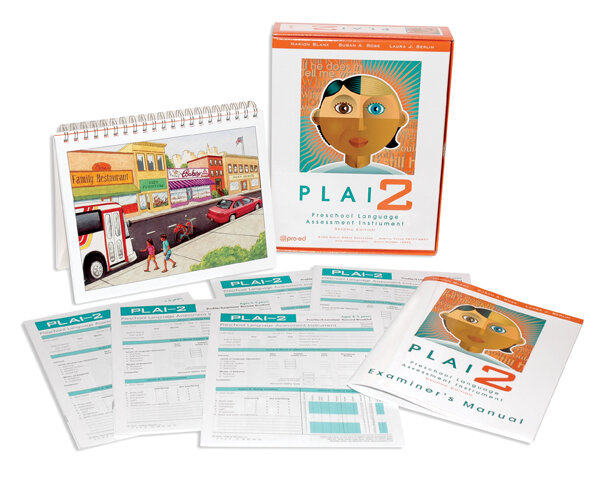Please specify the quantity of product(s).



Pre-school Language Assessment Instrument- Second Edition (PLAI-2)
| Item | Product | Price | QTY |
|---|---|---|---|
| 32660 | Pre-school Language Assessment Instrument- Second Ed, Kit | $300.00 | |
| 32660A | PLAI-2 Profile/Examiner Rec.Booklets, 3-year olds, Pk/25 | $62.00 | |
| 32660B | PLAI-2 Profile/Examiner Rec.Booklets, 4/5 year olds, Pk/25 | $62.00 | |
| 32660P | PLAI-2 Picture Book | $119.00 |
Assesses a child’s ability to meet the demands of classroom discourse. Full-color illustrations have been updated with increased gender and ethnic representation.
Marion Blank, Susan A. Rose and Laura J. Berlin
- Age Range: 3 to 6 years
- Time: 30 minutes, individual administration
The PLAI-2 assesses how effectively a child integrates cognitive, linguistic and pragmatic components to deal with student-to-teacher verbal exchanges. Teachers, speech-language clinicians, and special education professionals will appreciate the ease-of-use and multi-faceted information this test provides. It also serves as a guide for structuring teaching and therapy, and evaluates the effectiveness of intervention efforts.
Norm-Referenced Assessment
Four assessing levels of abstraction and two assessing modes of response provide a Discourse Ability Score:
- Matching — linking of verbal and perceptual information
- Analysis — identification and/or combining of perceptual components
- Reordering — reduction or restructuring salient perceptual cues
- Reasoning — prediction of events and justification of ideas
- Receptive Mode — nonverbal response
- Expressive Mode — verbal response
Non-standardized Assessment
Consists of two pragmatic measures provide a fuller understanding of the pragmatic aspects of a child’s communication
- Adequacy of Response — evaluates the quality of the child’s expressive language on a four-point scale, ranging from Fully Adequate to Inadequate
- Interfering Behaviors — quantifies two major patterns of behavior that hamper interaction: under-responsive and over-responsive
Characteristics of the total normative sample relative to socioeconomic factors, gender, disability and other critical variables match the 1999 census. This normative information has been stratified by age. Studies showing the absence of gender, racial and ethnic bias have been provided.
Reliability coefficients are provided for the subgroups of the normative sample, as well as for the entire normative sample. Validity studies show the test is valid for a wide variety of subgroups, as well as the general population.
The PLAI-2 Kit includes the Manual, Picture Book, 25 each of the Profile/Examiner Record Booklets for 3-year-olds and for 4/5-year-olds.